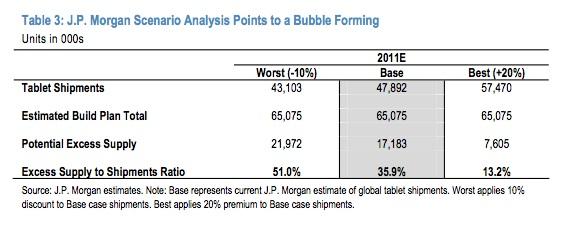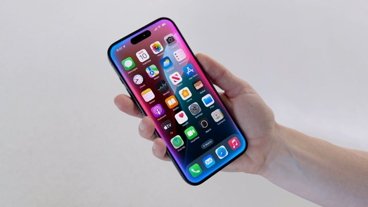JP Morgan: Apple's iPad 2 could cause 'bubble burst' for rival tablets
Analyst Mark Moskowitz of J.P. Morgan Research warned investors early Wednesday that build plans for tablet shipments from Apple's rivals may be too high, presenting "increasing risk of a bubble burst" in the second half of 2011.
"In our view, the technical and form factor improvements of the iPad 2 stand to make it tougher for the first generation of competitive offerings to play catch-up, meaning actual shipments could fall well short of plan," Moskowitz wrote.
Using discounted build plan estimates to project tablet shipments for the year, the analyst claims that tablet makers will build approximately 65.1 million tablets in 2011. When compared against J.P. Morgan's estimates of 47.9 million tablets sold this year, companies could find themselves with as much as 51 percent oversupply in a worst case scenario.
Apple is expected to maintain the lion's share of the tablet market. Moskowitz estimates that Apple could see nearly 100 percent sales growth year over year, resulting in more than 29 million iPads sold worldwide in 2011.
According to Moskowitz, component suppliers could stand the most to lose from a bubble burst. "Based on our research inputs, tablet makers eager to emulate Apple’s meteoric start are trying to secure components with inflated build plans," Moskowitz noted. "Of note, glass displays, processors, and, to a lesser extent, NAND Flash are the components that could be most at risk."
Moskowitz has a "favorable view of Apple's products and operating model," but acknowledges that "Apple is not for everyone." However, holdouts hoping for an alternative to Apple's iPad may be "underwhelmed" by rival offerings.
"Aside from Motorola’s Xoom and HP’s TouchPad (which does not have a price tag yet), the competitive offerings appear to be light on attraction, in our view," said Moskowitz.
J.P. Morgan maintains an Overweight rating on Apple with a price target of $450.
Initial Wall Street response to the unveiling of the iPad 2 last week has been favorable. In general, analysts were impressed by what were seen as "evolutionary" upgrades to the device and the thinner and lighter form factor. At the time, Moskowitz admitted that his firm's forecast of Apple holding 68 percent market share in 2011 "may be conservative" in light of the iPad 2.
 Josh Ong
Josh Ong














 Amber Neely
Amber Neely
 Thomas Sibilly
Thomas Sibilly
 AppleInsider Staff
AppleInsider Staff
 William Gallagher
William Gallagher
 Malcolm Owen
Malcolm Owen
 Christine McKee
Christine McKee










88 Comments
I think this is quite possible... the only way to compete with Apple's economies of scale is to buy big. However, if the product is as lackluster as the Xoom (great specs, poor experience) then they are likely to be left with a glut that they have to shift at discount bin prices (see 7" Galaxy Tab).
Consumers (in surveys) tend to rate Apple kit as worth about 20-25% more than the actual cost. Competing products are often the inverse. Thus a $500 iPad is perceived to be worth $600+ but a $500 GTab is likely to be seen as worth about $400.
That is a massive hurdle for OEMs. People are likely to choose iPad a very high proportion of the time unless OEMs price their stuff way below and thus make no $s on it.
It explains a lot of the iPod success where people typically will still not buy the cheaper competition even at a discount - hence 70% long term market share.Oh, and 1st
If people beat Apple at all it's on price. That is how the Android phones sneaked in, on lower priced handsets. But that won't happen with the iPad, for a while at least, since Apple are being very aggressive on price.
According to one Wall Street analyst, Apple's soon-to-be-released iPad 2 could burst a bubble for competitors who are hoping to capitalize on the growing tablet market but remain unable to catch up.
It's understandable. The competitors only had about 20 years to think about it. Just give them a little more time. It's good for them that the price of copy machines have gone down in price since then!
</sarcasm></rolleyes>
If people beat Apple at all it's on price. That is how the Android phones sneaked in, on lower priced handsets. But that won't happen with the iPad, for a while at least, since Apple are being very aggressive on price.
Not only on price (which is big) but also carrier push distribution - any carrier without the iPhone massively pushed Androids. It will be interesting to see the actual rebalancing in Verizon's smartphone portfolio at the end of the year with iP4 and iP5. More so if Apple release a true value competitor (though I doubt that will be a such a big deal in the subsidized US).
It's understandable. The competitors only had about 20 years to think about it. Just give them a little more time. It's good for them that the price of copy machines have gone down in price since then!
</sarcasm></rolleyes>
haha... good one. i'm glad you put the sarcasm word below, otherwise a new discussion would have start right here.